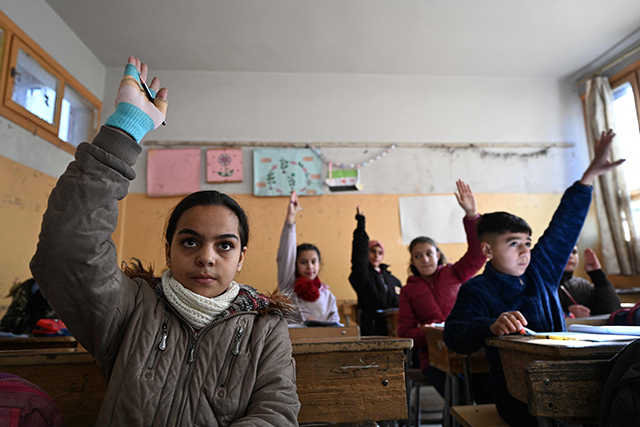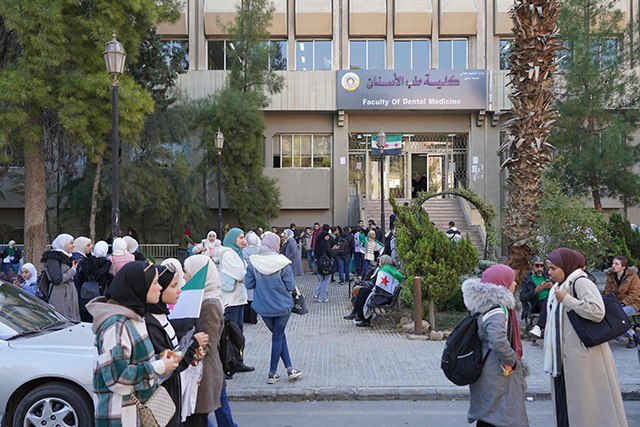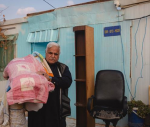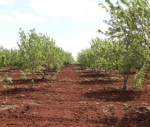You are here
Turkey braces for surge of Syrian refugees heading home
By AFP - Dec 10,2024 - Last updated at Dec 10,2024
ANKARA/BERLIN — Turkey has expanded its border crossing capacities to accommodate the surge in Syrian refugees seeking to return home following the fall of Bashar Al Assad, the interior minister has said.
Following Assad's ouster on Sunday, hundreds flocked to Turkey's southern border with Syria, with Ankara quickly moving to expand its crossing facilities, Interior Minister Ali Yerlikaya told reporters in remarks published on Tuesday.
"Although we had a daily capacity to accommodate 3,000 crossings, we have increased that to between 15,000 and 20,000," Yerlikaya said.
Turkey is home to nearly three million refugees who fled after the start of the civil war in 2011, with Ankara hoping the tectonic shift in neighbouring Syria will allow many to return home.
Yerlikaya said "300-400" people crossed the frontier on Sunday but by midday on Monday, that number had "doubled".
"We will have a meeting with Syrian NGOs on Wednesday afternoon" about the refugees' return, he said, without specifying which groups would be involved.
Yerlikaya said since 2016, "more than 738,000 Syrians" had voluntarily returned home, with a total of 2,935,000 still left in Turkey.
Turkey shares a 900-kilometre border with Syria.
Meanwhile, Britain, Germany, France, Italy and several other European countries said Monday they would freeze all pending asylum requests from Syrians, a day after the ouster of Assad.
While Berlin and other governments said they were watching the fast-moving developments in the war-ravaged nation, Austria signalled it would soon deport refugees back to Syria.
Far-right politicians elsewhere made similar demands, including in Germany -- home to Europe's largest Syrian community -- at a time when immigration has become a hot-button issue across the continent.
Alice Weidel, of the anti-immigration Alternative for Germany, reacted with disdain to Sunday's mass rallies by jubilant Syrians celebrating Assad's downfall.
"Anyone in Germany who celebrates 'free Syria' evidently no longer has any reason to flee," she wrote on X. "They should return to Syria immediately."
World leaders and Syrians abroad watched in disbelief at the weekend as Islamist-led rebels swept into Damascus, ending Assad's brutal rule while also sparking new uncertainty.
A German foreign ministry spokesman pointed out that "the fact that the Assad regime has been ended is unfortunately no guarantee of peaceful developments" in the future.
Germany has taken in almost one million Syrians, with most arriving in 2015-16 under ex-chancellor Angela Merkel.
Interior Minister Nancy Faeser said many Syrian refugees "now finally have hope of returning to their Syrian homeland" but cautioned that "the situation in Syria is currently very unclear".
The Federal Office for Migration and Refugees had imposed a freeze on decisions for ongoing asylum procedures "until the situation is clearer".
She added that "concrete possibilities of return cannot yet be predicted and it would be unprofessional to speculate in such a volatile situation".
Rights group Amnesty International slammed Germany's freeze on asylum decisions, stressing that for now "the human rights situation in the country is completely unclear".
The head of the UN refugee agency also cautioned that "patience and vigilance" were needed on the issue of refugee returns.
'Repatriation and deportation'
In Austria, where about 100,000 Syrians live, conservative Chancellor Karl Nehammer instructed the interior ministry "to suspend all ongoing Syrian asylum applications and to review all asylum grants".
Interior Minister Gerhard Karner added he had "instructed the ministry to prepare an orderly repatriation and deportation programme to Syria".
"The political situation in Syria has changed fundamentally and, above all, rapidly in recent days," the ministry said, adding it is "currently monitoring and analysing the new situation".
The French interior ministry said it too would put asylum requests from Syrians on hold, with authorities in Belgium, the Netherlands, Switzerland, Denmark, Sweden and Norway announcing similar moves.
Britain's interior ministry said it was taking the same measure "whilst we assess the current situation".
The Italian government said late Monday after a cabinet meeting that it too was suspending asylum request "in line with other European partners."
The leader of the far-right Sweden Democrats, a coalition partner in the government, said residence permits for Syrian refugees should now be "reviewed".
"Destructive Islamist forces are behind the change of power" in Syria, wrote their leader Jimmie Akesson on X.
"I see that groups are happy about this development here in Sweden. You should see it as a good opportunity to go home."
In Greece, a government spokesman voiced hope that Assad's fall will eventually allow "the safe return of Syrian refugees" to their country, but without announcing concrete measures.
'Populist and irresponsible'
In Germany, the debate gained momentum as the country heads towards February elections.
Achim Brotel, president of a grouping of German communes, called for border controls to stop fleeing Assad loyalists reaching Germany.
The centre-right opposition CDU suggested that rejected Syrian asylum-seekers should now lose so-called subsidiary protection.
"If the reason for protection no longer applies, then refugees will have to return to their home country," CDU legislator Thorsten Frei told Welt TV.
CDU MP Jens Spahn suggested that Berlin charter flights to Syria and offer 1,000 euros ($1,057) to "anyone who wants to return".
A member of Chancellor Olaf Scholz's Social Democrats criticised the debate as "populist and irresponsible".
Greens party deputy Anton Hofreiter also said "it is completely unclear what will happen next in Syria" and deportation talk was "completely out of place".
Many Syrians in Germany have watched the events in their home country with great joy but prefer to wait and see before deciding whether to return.
"We want to go back to Syria," said Mahmoud Zaml, 25, who works in an Arabic pastry shop in Berlin, adding that he hopes to help "rebuild" his country.
"But we have to wait a bit now," he told AFP. "We have to see what happens and if it is really 100 percent safe, then we will go back to Syria."
Related Articles
ISTANBUL / BEIRUT — More than 7,600 Syrian migrants crossed the Turkish border to return home in the five days after the fall of Syrian stro
DAMASCUS — It has been a week since rebels Hayat Tahrir al-Sham (HTS) and other rebels toppled long-time strongman Bashar al-Assad.Here are
LONDON — "How did you leave Syria?", "Is your family still in Aleppo?", "How do you move forward after fleeing Syria?" At a museum in t


















